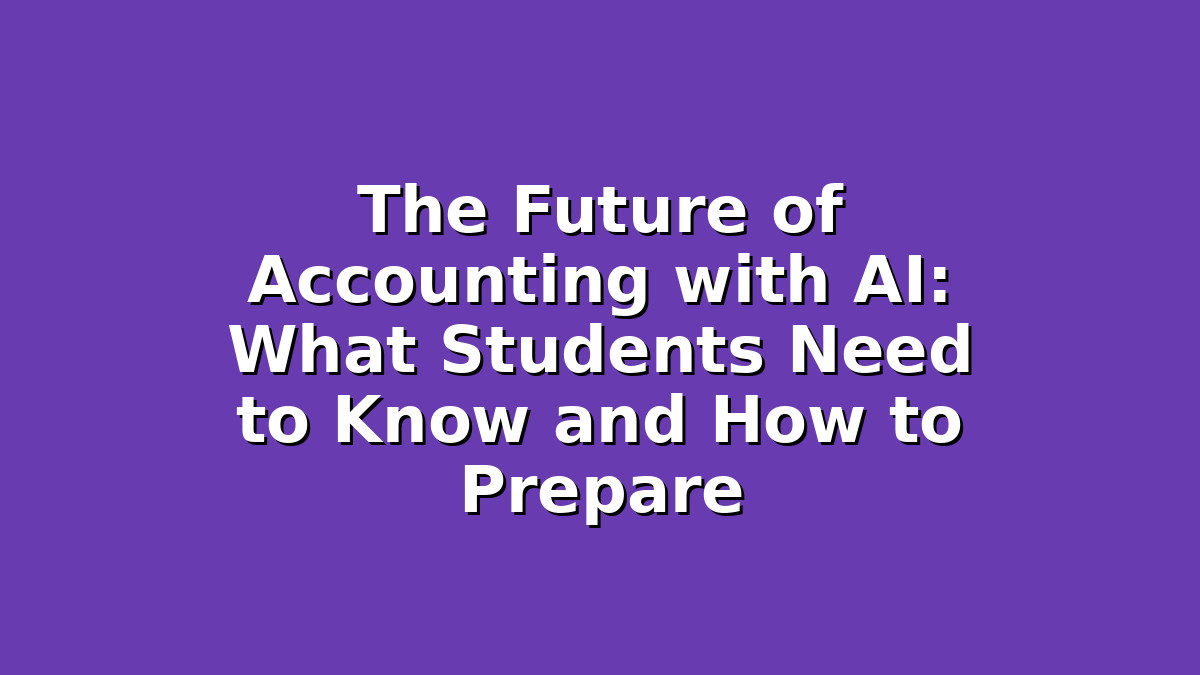As technology continues to evolve at an unprecedented pace, artificial intelligence (AI) is reshaping industries worldwide—and accounting is no exception. For students preparing for exams or aiming to excel in their studies, understanding how AI will influence the accounting profession is crucial. Not only will this knowledge give you insight into future career opportunities, but it can also help you tailor your learning strategies to stay ahead in a competitive job market.
In this article, we’ll explore the future of accounting with AI, break down three important areas where AI is making an impact, and offer practical study tips to help you adapt and thrive. Whether you’re studying financial accounting, auditing, or managerial accounting, these insights will empower you to approach your studies with confidence and curiosity.
1. How AI is Transforming Accounting: Key Trends Students Should Know
Artificial intelligence is revolutionizing accounting by automating routine tasks, improving accuracy, and providing deeper insights through data analytics. Here are some of the most important AI-driven changes you should be aware of as a student:
– Automation of Repetitive Tasks: Many accounting functions such as data entry, invoice processing, and reconciliations are increasingly being handled by AI-powered software. This reduces manual errors and frees up accountants to focus on higher-level analysis.
– Enhanced Data Analytics: AI tools can analyze vast amounts of financial data quickly, identifying patterns and anomalies that would be difficult for humans to spot. This supports better decision-making and risk management.
– Improved Auditing Processes: AI assists auditors by automating sampling and testing procedures, enabling more thorough and efficient audits. It can also flag potential fraud or compliance issues for further investigation.
Understanding these trends will not only help you grasp the evolving role of accountants but also highlight the skills you’ll need to develop to remain relevant—critical thinking, problem-solving, and technological literacy.
Study Tip: When reviewing accounting concepts, try to integrate AI-related examples or case studies. Look for real-world applications of AI in accounting to make your learning more practical and future-oriented.
2. Essential Skills to Develop for a Career in AI-Driven Accounting
As AI changes the accounting landscape, the profession will require a blend of traditional accounting knowledge and new skills related to technology and data. Here are three key skill areas students should focus on:
– Technical Proficiency: Familiarize yourself with accounting software that incorporates AI features, such as QuickBooks with automation tools, Xero, or cloud-based ERP systems. Learning basics of data analytics software (Excel advanced functions, Power BI, or Tableau) will also be beneficial.
– Data Literacy: Understanding how to interpret and analyze data is becoming more important than ever. Strengthen your quantitative skills by practicing financial modeling, ratio analysis, and the use of formulas and pivot tables in spreadsheets.
– Critical Thinking and Ethical Judgment: While AI can automate many tasks, human oversight remains vital. Develop your ability to evaluate the outputs of AI critically, especially when it comes to ethical considerations and compliance with accounting standards.
Study Tip: Incorporate hands-on practice with accounting and data analysis software into your study routine. Many platforms offer free trials or student versions—explore these tools alongside your textbooks to build comfort and competence.
3. Study Strategies to Excel in an AI-Influenced Accounting Curriculum
Adapting your study habits to the future of AI in accounting can give you a significant advantage. Here are some strategies tailored to students preparing for exams or trying to deepen their understanding:
– Stay Updated on AI Developments: Set aside time each week to read articles, watch videos, or listen to podcasts about AI applications in accounting. This will help you connect theoretical knowledge with emerging real-world trends.
– Collaborate and Discuss: Join study groups or online forums focused on accounting technology. Discussing how AI impacts accounting problems or case studies enhances comprehension and exposes you to diverse perspectives.
– Apply Problem-Based Learning: Instead of memorizing concepts, practice applying them in scenarios that include AI elements—such as automated bookkeeping or AI-based audit checks. Simulating these scenarios improves retention and prepares you for practical challenges.
– Balance Theory and Practice: While mastering accounting principles remains essential, allocate time to experimenting with AI tools or data visualization software. This blend will build a well-rounded skill set that appeals to future employers.
Study Tip: Create a study schedule that integrates traditional accounting revision with sessions dedicated to technology and AI-related topics. Use flashcards, quizzes, and online tutorials to reinforce both areas effectively.
Conclusion
The future of accounting is undoubtedly intertwined with artificial intelligence, presenting both exciting opportunities and new challenges. As a student, embracing this change early on will give you a competitive edge, equipping you with the knowledge and skills needed for a successful career. By understanding how AI is transforming accounting, developing the right technical and analytical skills, and adopting smart study strategies, you can confidently prepare for your exams and beyond.
Remember, AI is a tool to augment your abilities—not replace them. Cultivating adaptability, curiosity, and a commitment to lifelong learning will ensure you thrive in the evolving world of accounting. Stay motivated, keep exploring, and look forward to a future where your expertise and AI work hand in hand.
Good luck with your studies!

Responses